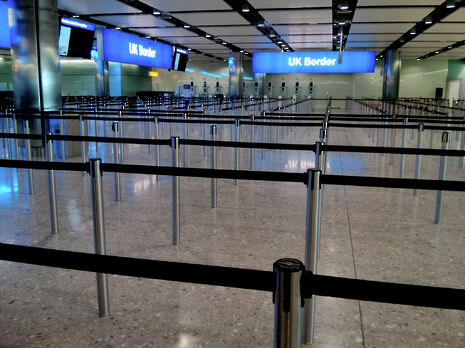UK less welcoming to prospective international students post-Brexit
Survey suggests climate of volatility after June’s referendum may be putting off overseas students

A survey of potential international students has revealed that 30 per cent are not likely to to come to the UK to study as a result of the EU referendum, while six per cent said they would definitely not choose Britain as their destination.
Of the 1,014 respondents to the survey, carried out by student recruitment consultancy Hobsons, 83 per cent were from outside the EU. Their responses echoed a previous pre-referendum poll by the company, in which almost half of prospective international students thought that Brexit would make UK universities less attractive.
The most common cause for concern cited by respondents was that the UK seemed less welcoming as a result of Brexit. According to the latest survey, for the portion of people who felt that Brexit made it less likely for them to study in the UK, 58 per cent cited this.
Such anxieties may have been fuelled by the well-documented rise in xenophobic attacks following the Brexit vote. In Huntingdon, a town near Cambridge, laminated cards reading “Leave the EU – no more Polish vermin” were posted to members of the Polish community.
In a statement released to University of Cambridge staff and students last month, Vice-Chancellor Leszek Borysiewicz addressed this rise in instances of reported racism, saying that he was conscious “that times like these can reveal divisions within communities”.
However, there was some potentially good news for the Vice-Chancellor in the new survey – 61 per cent of all respondents said that the weaker Pound, which makes the relative cost of university here cheaper, made the UK more attractive to them.
Experts seem to agree that the problem for universities will be to emphasise stability in a time of uncertainty. Speaking to the Financial Times, Borysiewicz said: “It is the uncertainty that doesn’t help at the moment”.
Hobsons’ managing director, Jeremy Cooper, similarly noted that UK universities were facing “a period of uncertainty” and suggested that universities “send a clear message that the UK welcomes international students, as well as providing any practical guidance and support”.
The emphasis on stability was mirrored in the survey. One respondent said: “If UK universities could consider the volatility of the exchange rate for international students when determining the cost of attendance, adding extra funds as a kind of safety net, or introducing a programme that allows for an increase at a later disbursement - or some similar idea - that would put my mind at ease”
The Hobsons report comes amid rumours that around 100 EU students have cancelled their places at Aberystwyth University.
The Brexit Advisory Unit, which works with universities to advise them on engagement with the Government on policy and regulatory issues, estimate that 125,000 non-UK EU nationals are currently studying in the UK.
William Bain, head of the unit, commented on the survey, saying: “The issue of being able to attract and retain talent to work and stud in universities is absolutely paramount.
“The future direction and scale of involvement in policies on the free movement of workers and other EU nationals, like students, will have a real impact on funding, strategic positioning, economic performance, and the global reputation of UK higher education in the coming years.
"More restrictive UK immigration policy towards international students, co-operation on research. and development projects, and whether the UK could continue to be involved in areas such as Erasmus+ and Horizon 2020, are all key areas which need to be addressed.”
Indeed, there has been much concern within the academic community about the impact of Brexit on UK involvement in EU funded research projects.
In a confidential survey of the UK’s Russell Group universities, The Guardian found cases of British academics being pressured to leave EU-funded projects as they are now a financial liability.
However, Leszek Borysiewicz has appealed for calm, saying that the loss of research collaborations with European partners was something he had “not noticed … at Cambridge at all”.
 News / CUP announces funding scheme for under-represented academics19 December 2025
News / CUP announces funding scheme for under-represented academics19 December 2025 News / Cambridge welcomes UK rejoining the Erasmus scheme20 December 2025
News / Cambridge welcomes UK rejoining the Erasmus scheme20 December 2025 News / SU reluctantly registers controversial women’s soc18 December 2025
News / SU reluctantly registers controversial women’s soc18 December 2025 Film & TV / Timothée Chalamet and the era-fication of film marketing21 December 2025
Film & TV / Timothée Chalamet and the era-fication of film marketing21 December 2025 Features / In-person interviews through student helpers’ eyes20 December 2025
Features / In-person interviews through student helpers’ eyes20 December 2025









